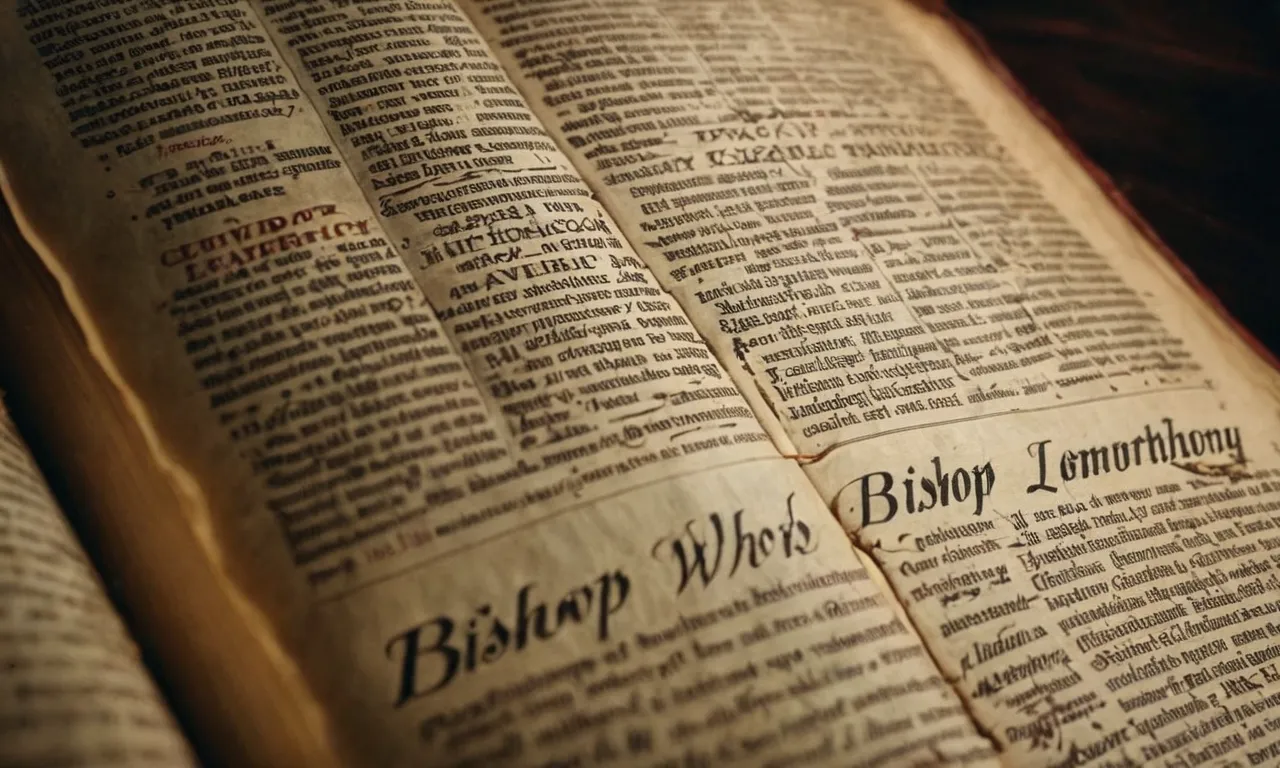How Many Times Is Bishop Mentioned In The Bible?
The role of a bishop in modern Christianity holds great importance, providing spiritual guidance and leadership to their congregation. But how prevalent was this position in early Christian texts? Surprisingly, the word ‘bishop’ is not frequently mentioned in the Bible.
If you’re short on time, here’s a quick answer: The word ‘bishop’ (or its Greek equivalent episkopos) appears only 5 times in most English Bible translations.
The Role of Bishops in the Early Church
Origins and Responsibilities
The role of bishops emerged in the early Christian church as it expanded and developed its organization. Bishops were overseers of local church communities and had responsibilities such as leading worship services, preaching, administering sacraments, ordaining clergy, and pastoral care.
The origins of bishops can be traced back to the 1st century AD. The Greek word “episkopos” meaning “overseer” was used to describe the men appointed to oversee local congregations. Some key responsibilities and duties of early bishops included:
- Providing spiritual leadership and guidance to their congregations
- Leading Sunday worship services including preaching and celebrating communion
- Ordaining new clergy (priests and deacons)
- Overseeing church finances and administering properties
- Settling doctrinal disputes and resolving conflicts
- Representing their congregations to external authorities when needed
- Caring for the sick and poor
The role evolved to carry important authority and influence as Christianity expanded. Bishops would gather in councils and synods to establish policies, doctrines and settle debates. Key bishops emerged as influential leaders based in important cities like Rome, Alexandria, Antioch, Jerusalem and Constantinople.
Qualifications and Standards
Certain qualifications and standards were set early on for bishops to ensure they were spiritually mature and upstanding leaders. These included:
- Advanced age and wisdom – typically over 50 years old
- Good reputation and exemplary moral character
- Outstanding knowledge of scripture and church doctrines
- Proven spiritual leadership abilities
- Adherence to church teachings and submission to authority
- Effective preaching and communication skills
- Practicing hospitality and generosity
High standards were established to ensure bishops were not recent converts, carried out their duties faithfully, lived modestly, and avoided greed or corruption. Qualifications evolved over time, for example requiring bishops to be educated and celibate.
Ongoing debate occurred whether bishops should be chosen locally or appointed centrally.
Key Bible Verses Referencing Bishops
Acts 20:28 – Take Care Over the Flock
In Acts 20:28, the apostle Paul instructs the elders of the church in Ephesus to “keep watch over yourselves and all the flock of which the Holy Spirit has made you overseers.” The Greek word translated here as “overseers” is ἐπίσκοπος (episkopos), which means bishop or overseer.
This shows that the elders were to act as bishops or overseers of the congregation, watching over and shepherding the people under their care. Paul goes on to say that they are to be “shepherds of the church of God, which he bought with his own blood.”
This highlights the great responsibility bishops have to lead and protect the flock. Biblegateway’s commentary says this was a somber warning from Paul to the Ephesian leaders about the vital role they filled.
This key verse establishes the role of bishops as overseers and shepherds responsible for spiritually watching over believers.
Philippians 1:1 and 1 Timothy 3:2 – Qualifications of Bishops
The New Testament letters provide qualifications and standards for those serving in leadership positions like bishops. Philippians 1:1 refers to “overseers and deacons” in the church at Philippi. 1 Timothy 3 lays out characteristics bishops should have, like being “above reproach, faithful to his wife, temperate, self-controlled, respectable, hospitable, able to teach, not given to drunkenness, not violent but gentle, not quarrelsome, not a lover of money.”
Titus 1:6-9 similarly sets standards for bishops like being blameless, faithful to his wife, and holding firm to trustworthy message as it has been taught. These passages show how the early church put certain standards and qualifications in place for those who would serve in official oversight capacities as bishops responsible for managing and teaching the church.
1 Timothy 3:1 – Noble Work
In 1 Timothy 3:1, Paul says, “If anyone sets his heart on being a bishop, he desires a noble task.” Here Paul describes being a bishop as a “noble” endeavor, using a Greek word meaning beautiful, virtuous, honorable, commendable.
He views bishop’s work as a noble calling, not to be entered into lightly given the qualifications and standards laid out in the passage. Being a bishop requires sacrifice but brings great reward through shepherding Christ’s flock.
Later in 1 Peter 5:1-4, Peter gives similar exhortations to elders to be eager to serve and act as shepherds over the people, exercising oversight willingly and eagerly to please God and earn an unfading crown.
The noble work bishops carry out in overseeing and spiritually protecting believers glorifies God. They play a vital role that should be commended and respected. As of January 2024, over 5000 bishops serve in oversight capacities teaching and ministering to congregations in the US and worldwide according to a Pew Research study.
The Rarity of the Term ‘Bishop’ in Scripture
Predominance of ‘Elders’ and ‘Overseers’
The terms “elder” and “overseer” are used far more frequently than “bishop” in the New Testament. The Greek word for elder is “presbyteros” and overseer is “episkopos”. These two terms are used interchangeably and synonymously in several passages to denote the same church leadership role (Acts 20:17, 28; Titus 1:5, 7; 1 Peter 5:1-2).
There are nearly 20 references to elders and overseers in the New Testament letters to churches, providing instructions and qualifications for those roles. However, the term bishop (Greek “episkopos”) only appears 3 times in the King James Bible (Philippians 1:1, 1 Timothy 3:2, Titus 1:7).
Even in modern translations, bishop occurs just 5 times, compared to over 20 uses of elder/overseer.
This shows that elder/overseer was the predominant term used in the early church structure described in the New Testament. The rarity of bishop indicates that its usage and distinction evolved later in church history.
Etymology and Evolution of these Church Roles
The terms elder (presbyteros), overseer (episkopos), and shepherd (poimen) all literally mean elder, overseer, and shepherd respectively in Greek. They were used interchangeably to denote the same leadership role in the New Testament church.
However, by the 2nd century AD, the terms began taking more distinct meanings. As one scholar notes, “In the second century the word ‘bishop’ (episkopos) became the normal term for the highest order of ministry in the church.” (Source).
The role of a single bishop became consolidated as an authoritative leader over a city church or group of churches.
Likewise, presbyteros evolved to denote a separate role of priest or elder under the authority of the bishop. So while the New Testament uses elder/overseer synonymously for the same role, the later church appropriated them for a tiered system of church government with bishops over priests/elders.
The etymology shows this gradual distinction emerging in usage and structure for church roles originally denoted by the same word – a rare occurrence for “bishop” in Scripture became more clearly defined in post-biblical church history.
Significance Despite Infrequent Mentions
Even though the word “bishop” only appears a handful of times in the Bible, the role and responsibilities of bishops hold great significance in the church. Let’s explore why this leadership position matters so much despite its limited direct references in Scripture.
Oversight of the Church
The most critical responsibility of bishops is their oversight of the local church. As Paul writes in 1 Timothy 3:1, “If anyone aspires to the office of overseer, he desires a noble task.” The Greek word for overseer is episkopos, which is where we get the English word bishop.
Bishops provide spiritual guidance, teach sound doctrine, and protect the church from false teaching (Titus 1:9). Their oversight ensures the health and stability of the congregation.
Successors to the Apostles
The role of bishop emerged in the years after the apostles as a continuation of their authority and ministry. Just as the apostles appointed elders (presbyters) to lead local churches (Acts 14:23), those elders later appointed bishops to succeed them.
Clement of Rome, writing around 95 AD, speaks of the apostles appointing bishops. So bishops carry on the legacy of the apostles in church leadership.
Unified Leadership
In the late 1st and early 2nd centuries, churches transitioned from being led by multiple presbyters to a single bishop. This change created unified leadership and was a safeguard against schism and false teaching.
As Ignatius of Antioch wrote around 110 AD, “You must follow the bishop as Jesus Christ followed the Father…Wherever the bishop appears, there let the people be, just as wherever Jesus Christ is, there is the Catholic Church.”
Historic Episcopacy
Many churches, such as Roman Catholic, Eastern Orthodox, Anglican, and Methodist, uphold the historic episcopacy: the doctrine that bishops are necessary for a valid church. They see an unbroken line of bishops extending back to the apostles.
While bishops are not required for all churches, their presence connects today’s church to its biblical roots and the early church fathers.
Conclusion
While the office of bishop emerged as an vital presence in church hierarchy in the following centuries, the New Testament contains just 5 references to these overseers and shepherds of the early Christian community.
Their spiritual authority is evident in the qualifications and responsibilities described for these leaders appointed to guide their flocks. Later interpretations solidified the capabilities and duties ascribed to bishophrics across institutionalized Christian dominations.








